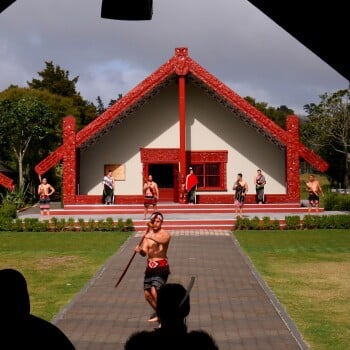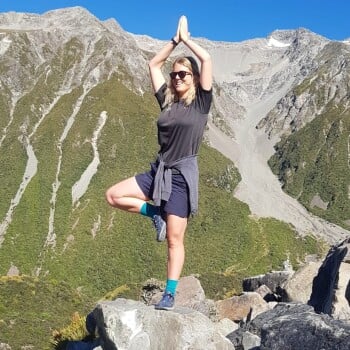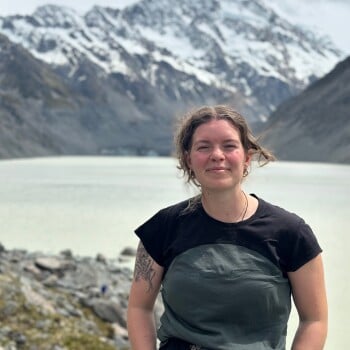- About Us
-
Trips
-
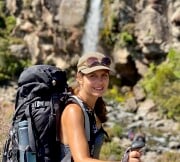 Kiwi-Style Hiking
Kiwi-Style Hiking
-
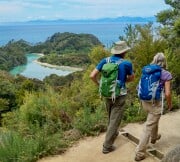 Great Walks
Great Walks
-
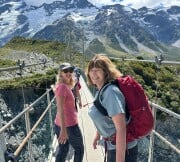 Hiking Tours
Hiking Tours
-
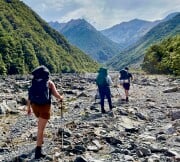 Alpine Hikes
Alpine Hikes
-
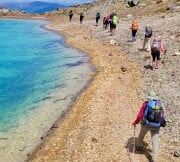 Custom Groups
Custom Groups
- Huayhuash Trek
- Family Northern Explorer
- Family Southern Explorer
- Lake Waikaremoana Hike
- Women's Custom Tours
- Women's Southern Wilderness
- Coast, Canyons and Mountains
- Coastal Wanderer Custom Tour
- Don't Cross the Ladies
- Secret South Custom Tour
- Tekapo Hike
- West Coast Custom Tour
- World Heritage Custom Tour
-
- Blog
- Shortlist
- About Us
- Trips
- Blog
- Shortlist

Sep 20, 2021
Dreaming of a tropical breeze
My toes are going numb in my frozen boots and I try to crack the ice off my gaiters. My fingers ache as I bend the frosty canvas around my calf. I woke with ice on the inside of the tent. *brrrr* winter has arrived. As I build an early morning fire, my mind drifts to life before covid and “what could have been” my winter reality. I found myself daydreaming of a tropical breeze and the smell of saltwater.
Love for adventure
I have no doubt that many people are experiencing a lifestyle entirely different to the one they imagined at the start of 2020. As for me, after years of working odd jobs and travelling for long stints in between, my partner Inky and I made a commitment to begin saving for a house and land. That meant working year-round, with little (okay, less) money spent on travel. We had it all figured out and we wouldn’t have to sacrifice our love for adventure!
After two successful and incredibly rewarding seasons working as a guide for Hiking New Zealand, I was hooked! I’ve worked in a diverse number of fields, and nothing brought me more joy than showing others the grand beauty of Aotearoa New Zealand. The guiding season is between November and May, leaving a large window of opportunity for the remainder of the year. Fortunately for me, I married a sailor, meaning that between our guiding seasons there were copious amounts of freelance work available at sea.
As hard as it was for my Kentucky family to make sense of my lifestyle choice - it was for me the ultimate plan. But, a week before our flight to Italy to work on a private yacht the New Zealand government actioned a nationwide lockdown. We quickly learned that this sort of plan can have consequences. And it seems a global pandemic was the very best way to derail us.

Derailed plans create new opportunities
After a number of months of uncertainty, I am now back with the company I have come to call my new family. Hiking New Zealand received a grant from the government through the Jobs for Nature programme. This programme helps revitalise communities through nature-based employment and helps stimulate the economy post covid. Hiking New Zealand is completing this conservation work through its Active Earth brand with a vision to
Connect people to place,
Take care of our land,
Take care of our taonga,
Take care of our people
The Rangiora-based company is working alongside the local DoC office in order to protect and monitor the kākāriki karaka/orange-fronted parakeet. We have eyes, ears and traps up the Hawdon, Andrews, Poulter, and Binser Valleys in Arthur’s Pass National Park. To learn more about the nuts and bolts of our jobs, read Adrienne’s blog A day in the Life of a Trapper.
From hiking guide to trapper
I must admit that the lifestyle change, from being an employed hiking guide to a trapper, is quite different. Once traversing the South Island once a month with a bus full of enthusiastic travellers, I now return to just the same three valleys each week and spend eight hours a day alone in the beech forest: such a contrast to long days with small groups of enthusiastic tourists. I no longer have to craft my music collection with the thought of others, I now fill my brain cabinets with podcasts and audiobooks as I walk or when I relax in the evenings. I have also realised that, perhaps, I took for granted the fact that I was able to visit places like Mt Cook village and Milford Sound 5 or 6 times a summer when I was accompanying tourists. I haven’t been to either destination in over a year. Lastly, I see far more guts and maggots than I would on an average summer as a guide. But that’s okay as I do enjoy the change of pace. But I have yet to come to terms with frozen boots. My body seems to know option 1 was escaping winter to cruise on sailboats in warm places and protests every morning!
I suppose many guides who lost their jobs because of covid would muse that our kind is not meant to work between four walls or beneath fluorescent lights.But I believe hiking guides make great trappers. We are fit and have essential backcountry skills like navigation, being able to live remotely, cross rivers safely, understanding weather, knowing first aid and so on. And let’s face it, our social and home life is (or should be) quite well adapted to being away for long stints at a time. I would also venture to say that most of us enjoy it that way.

Doing my bit for conservation
I always felt that I could be doing a bit more than driving high-carbon-footprint-cargo (humans) across the country for a holiday, so it feels bloody good to be giving back to the national parks in this way. I now really enjoy having an insider's understanding of conservation projects in New Zealand and can only imagine the stories and insight I will have to share with my clients when tourism comes back to our island nation!
To be a part of creating a more ecologically minded tourism economy is important. I believe through education, regulations and a push towards conservation tourism we can reimagine tourism in Aotearoa New Zealand. I see an industry where conservation is pivotal and active, not just viewing a supply of maintained wilderness preserves. I see my current job as an opportunity to upskill on projects and activities so that I can then lead keen visitors to participate in conservation in future. By diversifying my outdoor job into conservation, I have become a better backcountry steward and a participatory citizen to both this land and its economy.
“Kaakawww…” I am writing this from our little Hut deep in the mountains, and a parakeet just flew over our campsite, perhaps investigating the smoke of my fire, maybe thanking us for our trapping work? My thoughts come back from the tropical ocean to the quiet frozen beech forest around me. In this moment I am reminded that my current work to preserve New Zealand’s rare wildlife, is maybe worth the cost of a few cold toes.

